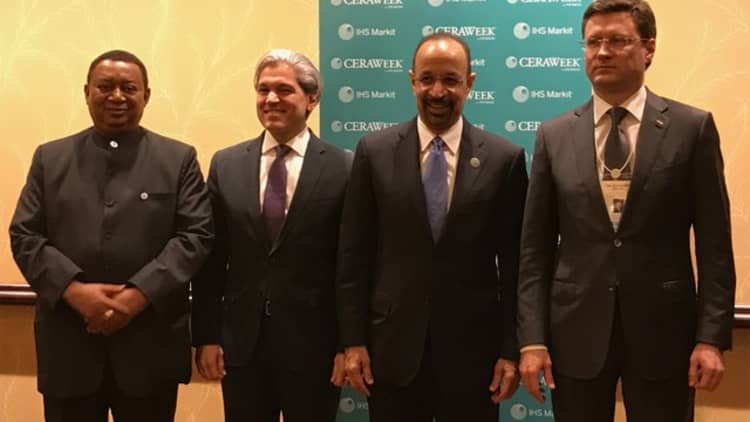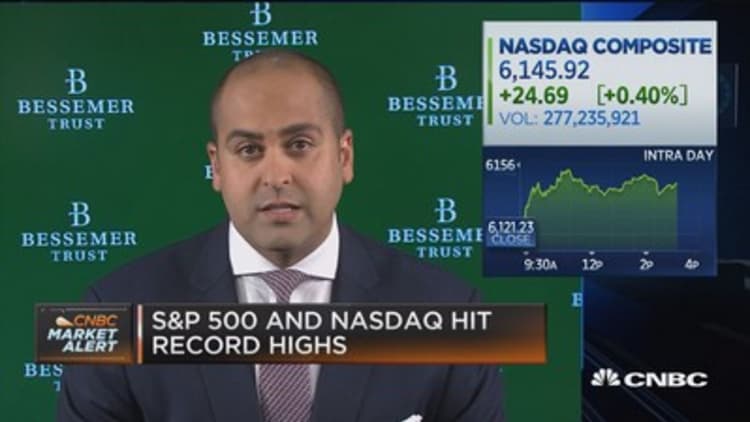
Saudi Arabia and Russia put their weight behind a new agreement to curb oil production, a deal analysts say should drive up crude prices but also underscores a growing alliance between the two countries.
The oil ministers of Saudi Arabia and Russia on Monday said they would consult other nations on an agreement to extend the current production deal between OPEC and non-OPEC producers by nine months, about three months longer than the market expected.
The deal to keep 1.8 million barrels of crude from the market is likely to embolden U.S. shale producers to ramp up their production, but it is also a deal that both Russia and Saudi Arabia would see as politically expedient and critical to their domestic finances.
"For the Saudis, as for all the other exporters, low prices could really create enormous stress. They really want to solve this issue," said Daniel Yergin, vice chairman of IHS Markit.
"For the Russians, they've seen their sovereign wealth fund deplete quickly, and the oil revenues are a big part of the government budget," he said.
The extension of the production deal was also announced just days before President Donald Trump visits Saudi Arabia on his first overseas trip, which also includes Israel and Rome.
"Think about what they get from Trump and the Republicans. They want to get a whole lot of precision-guided missiles," said Helima Croft, head of global commodities strategy at RBC. Besides discussing weapons deals, she said, Saudi Arabia wants to know the U.S. "fully has their back and we will do what it takes to roll back Iranian influence."
Russian energy minister Alexander Novak and Saudi Arabia energy minister Khalid al-Falih announced their support for an extension of the deal at a joint briefing in Beijing on Monday after a meeting of the G-20 countries.
Saudi Arabia had felt the pinch of lower prices, though several weeks ago it reversed a move to withhold some pay and benefits to government workers, a move analysts saw as a possible effort to ward off unrest.
Saudi Arabia also needs a high oil price to help its plan to diversify its economy away from crude, under its Vision 2030 plan. The cornerstone of that plan is the IPO of the state-owned energy company Saudi Aramco, which analysts say would do better with a higher oil price.
For Russia, higher oil prices have helped its economy. "This is the first year they were out of recession. … What was the only good news for Russia? The oil price. I don't think it's a coincidence they're extending it to March," said Croft.
Edward Morse, global head of commodities research at Citigroup, said he believes there's a 60 to 70 percent chance the deal could also include deeper cuts than the 1.8 million barrels a day already agreed to late last year. He expects the market to rebalance and West Texas Intermediate crude to be up to $62 per barrel by the end of the year.
He also said it's not surprising Russia and Saudi Arabia are moving closer together to solve their common problem of low oil prices.
"There are three giant oil producers in the world," he said. "Two of them are
He said one will end that relationship first. "I think Russia has more of a dilemma in a volume versus price tradeoff."
Saudi Arabia has borne the lion's share of the production cuts, announced in December and effective in January, and Morse said they would no doubt take on more if there are deeper cuts.
Even before the original deal was announced in December, oil prices ran up on speculation and continued to hold in the $50s for several months. But continuing large inventory builds in the U.S., rising production, and more supply from Libya and elsewhere ramped up speculation that the world would remain oversupplied.
"You have this new world order with Saudi and Russia," said Croft. "This is not a one-off, that Russia got involved in OPEC. … It's not like Russia joined OPEC, but you have this new framework. Putin's influence in the Middle East has done nothing but soar, as [the U.S.] pulled back."
She said the relationship between Saudi Arabia and President Barack Obama was not
The Trump administration has taken a harsher tone with
"It's not an accident that the two countries [Russia and Saudi Arabia] were moving together at a time when maybe [the relationship between] the United States and Saudi Arabia was problematic," Morse said. "It's become a lot less problematic since President Trump was elected."
Chris Weafer,
"If it means $55 instead of $40, it's $25 billion for the budget," he said. "But in terms of politics, it means the Saudis owe the Russians a favor. … It means the Russian position in Syria which the Saudis criticized, they are no longer criticizing."
Weafer said there are also rumors that the Saudis would be interested in investing in Russian energy.
"We have the Russians supporting not just OPEC but mainly Saudi Arabia. [Extending] the production cuts
Bin Salman is also behind the Saudi Vision 2030 plan to diversify the economy away from oil.
Croft said the timing of the OPEC production extension coincides with the Russian presidential election next March, another reason Russia may have been keen to strike a new deal.
"I don't think anyone thinks Putin will lose. He doesn't want protesters. I don't think Putin wants to risk a significant uptick in discontent going into those elections," she said.
Thousands of Russians protested last weekend about a plan by the city of Moscow to tear down Soviet-era housing.
"I think what greatly concerned the Kremlin was that ordinary people protested. … The idea of real people in the streets with some real issue, they freak, and they address it very quickly," said Weafer.
"Both leaders, both governments are concerned about social issues on the back of tighter budgets. For Saudi, the deputy crown prince has really staked a lot on the budget revisions, on the 2030 program, and also getting Aramco away at a very high rate," said Weafer.
Other members of OPEC are expected to endorse the agreement at their May 25 meeting.
West Texas Intermediate edged back toward $50, settling up 2.1 percent at $48.85 per barrel Monday, and Brent, the international benchmark, was at just under $52 per barrel.
Watch: Crude higher for fourth straight session



